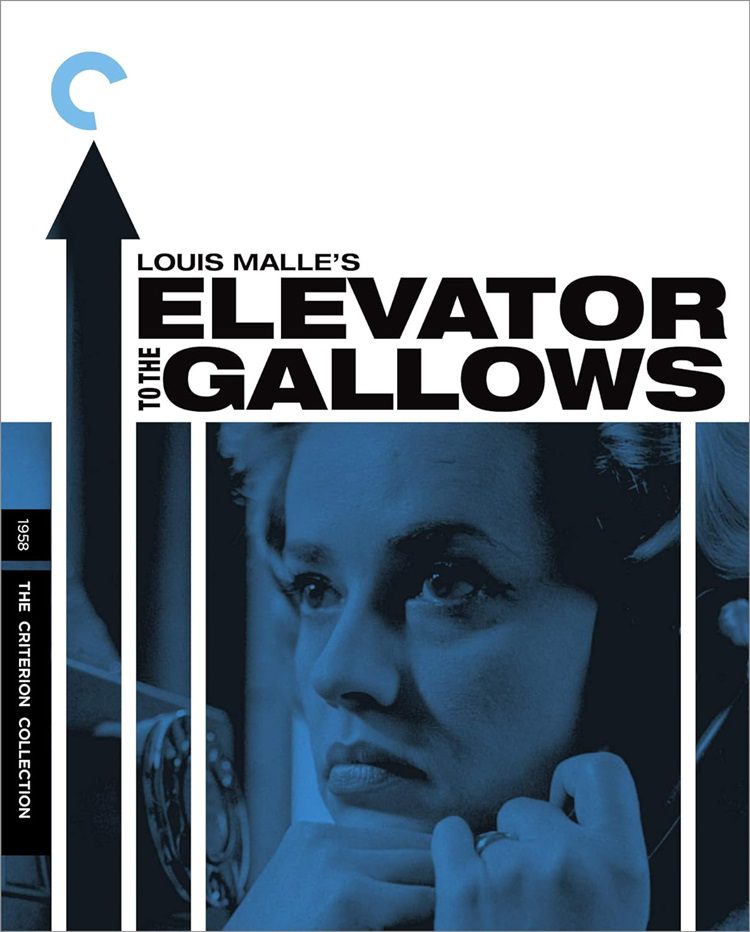
Louis Malle’s directorial debut is notable for numerous reasons. He was only 24 years old at the time, fresh off a three-year stint working at sea with famed oceanographer Jacques Cousteau where he only had to “direct fish”, as he was frequently fond of recounting. He had no real pull in the film industry, and yet was able to land the already established actress Jeanne Moreau to star, as well as jazz titan Miles Davis to contribute a totally improvised score. His best accomplishment: the resulting film is a resounding success, largely thanks to his sure-handed direction of its mesmerizing criminal plot.
The film opens with an amorous phone conversation between Julien (Maurice Ronet) and Florence (Jeanne Moreau), but this is no love story. We quickly learn that Florence is married to Julien’s boss, but the lovers are about to run away together as soon as Julien kills her husband, a wealthy businessman. Julien carries out his crime at the office, climbing up to his boss’s office on the outside of their building, staging a suicide, and then rushing back down to his office before the building closes for the weekend. Unfortunately, he’s in such a hurry that he leaves his grappling hook attached in plain sight on the building, setting in motion a spiraling series of dominoes that lead to dire consequences for numerous people.
Upon realizing his error after leaving the building, he leaves his fancy car idling outside and attempts to take the building’s elevator back up to his office, unfortunately ending up trapped inside the elevator when the power is turned off for the weekend. Meanwhile, his car gets jacked by a young couple out for a joyride, while Florence sees it driving away with the young girl in the passenger seat, leading her to assume Julien has run off with another woman. When another murder is committed, Julien becomes the prime suspect, putting him in the impossible conundrum of how to provide an alibi for his time in the elevator without implicating himself in the murder of his boss. All four of the principal characters are amoral, make poor decisions, and end up on the wrong side of the law, but make for delightful subjects in this twisty, intense tale.
Criterion’s Blu-ray is a sparkling new 2K digital restoration from the original 35mm negative, with uncompressed monaural soundtrack from the optical track of a 35mm fine-grain positive. The luminous black and white photography is simply stunning, particularly in shots that focus on Moreau’s character woefully wandering Paris streets in search of her lover. The film is presented in its original 1.66:1 format, resulting in small black bars whether you’re watching on a standard widescreen (vertical) or a 4:3 television (horizontal). The soundtrack has been scoured to remove all imperfections, leaving a clear audio presentation highlighted by the Davis score.
Bonus features abound on the Blu-ray, led by archival interviews with Malle, Moreau, Ronet, and original soundtrack session pianist Rene Urtreger. I enjoyed the factual insight by the actors and director, but Urtreger’s feature leaned too heavily on his musings on what Davis might have been thinking during the improvisation of the score. Elsewhere, Moreau revisits her time with Malle in a 2005 interview, while another 2005 program features jazz trumpeter Jon Faddis and critic Gary Giddins discussing the score. Amazingly, there’s even footage of Davis and Malle from the soundtrack recording session thanks to a stunningly prescient TV program crew on hand to document the event. The bonus features wrap up with a presentation of Malle’s rough student short film Crazeologie, notable mostly for its use of Charlie Parker’s song “Crazeology”.
Malle’s debut film is a fascinating study of ruthless people taking desperate measures to recover from unforeseen events that cascade out from one tiny error in a perfectly planned murder. It’s a gem based on its story alone, but polished to a high gleam thanks to Malle’s steady direction, the beautiful cinematography, Moreau’s wistful visage, and the inspired score by Davis.